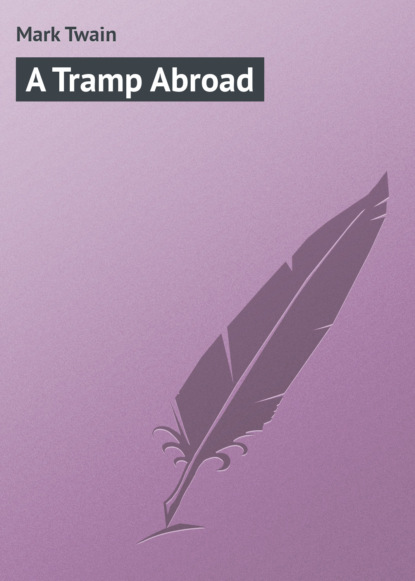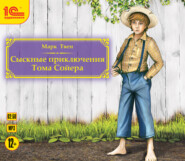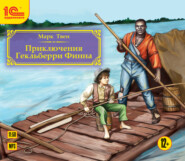По всем вопросам обращайтесь на: info@litportal.ru
(©) 2003-2025.
✖
A Tramp Abroad
Автор
Год написания книги
2015
Настройки чтения
Размер шрифта
Высота строк
Поля
“I offered my hand and the party gave me a shake.”
“I saw it! I did not believe my own eyes, at the time. Did the gentleman say anything about cutting your throat?”
“No, they all seemed glad to see me, as far as I could judge.”
“And do you know, I believe they were. I think they said to themselves, ’Doubtless this curiosity has got away from his keeper – let us amuse ourselves with him.’ There is no other way of accounting for their facile docility. You sat down. Did they ask you to sit down?”
“No, they did not ask me, but I suppose they did not think of it.”
“You have an unerring instinct. What else did you do? What did you talk about?”
“Well, I asked the girl how old she was.”
“Undoubtedly. Your delicacy is beyond praise. Go on, go on – don’t mind my apparent misery – I always look so when I am steeped in a profound and reverent joy. Go on – she told you her age?”
“Yes, she told me her age, and all about her mother, and her grandmother, and her other relations, and all about herself.”
“Did she volunteer these statistics?”
“No, not exactly that. I asked the questions and she answered them.”
“This is divine. Go on – it is not possible that you forgot to inquire into her politics?”
“No, I thought of that. She is a democrat, her husband is a republican, and both of them are Baptists.”
“Her husband? Is that child married?”
“She is not a child. She is married, and that is her husband who is there with her.”
“Has she any children.”
“Yes – seven and a half.”
“That is impossible.”
“No, she has them. She told me herself.”
“Well, but seven and a half? How do you make out the half? Where does the half come in?”
“There is a child which she had by another husband – not this one but another one – so it is a stepchild, and they do not count in full measure.”
“Another husband? Has she another husband?”
“Yes, four. This one is number four.”
“I don’t believe a word of it. It is impossible, upon its face. Is that boy there her brother?”
“No, that is her son. He is her youngest. He is not as old as he looked; he is only eleven and a half.”
“These things are all manifestly impossible. This is a wretched business. It is a plain case: they simply took your measure, and concluded to fill you up. They seem to have succeeded. I am glad I am not in the mess; they may at least be charitable enough to think there ain’t a pair of us. Are they going to stay here long?”
“No, they leave before noon.”
“There is one man who is deeply grateful for that. How did you find out? You asked, I suppose?”
“No, along at first I inquired into their plans, in a general way, and they said they were going to be here a week, and make trips round about; but toward the end of the interview, when I said you and I would tour around with them with pleasure, and offered to bring you over and introduce you, they hesitated a little, and asked if you were from the same establishment that I was. I said you were, and then they said they had changed their mind and considered it necessary to start at once and visit a sick relative in Siberia.”
“Ah, me, you struck the summit! You struck the loftiest altitude of stupidity that human effort has ever reached. You shall have a monument of jackasses’ skulls as high as the Strasburg spire if you die before I do. They wanted to know I was from the same ‘establishment’ that you hailed from, did they? What did they mean by ’establishment’?”
“I don’t know; it never occurred to me to ask.”
“Well I know. They meant an asylum – an idiot asylum, do you understand? So they do think there’s a pair of us, after all. Now what do you think of yourself?”
“Well, I don’t know. I didn’t know I was doing any harm; I didn’t mean to do any harm. They were very nice people, and they seemed to like me.”
Harris made some rude remarks and left for his bedroom – to break some furniture, he said. He was a singularly irascible man; any little thing would disturb his temper.
I had been well scorched by the young woman, but no matter, I took it out on Harris. One should always “get even” in some way, else the sore place will go on hurting.
Chapter XXVI
The Hofkirche is celebrated for its organ concerts. All summer long the tourists flock to that church about six o’clock in the evening, and pay their franc, and listen to the noise. They don’t stay to hear all of it, but get up and tramp out over the sounding stone floor, meeting late comers who tramp in in a sounding and vigorous way. This tramping back and forth is kept up nearly all the time, and is accented by the continuous slamming of the door, and the coughing and barking and sneezing of the crowd. Meantime, the big organ is booming and crashing and thundering away, doing its best to prove that it is the biggest and best organ in Europe, and that a tight little box of a church is the most favorable place to average and appreciate its powers in. It is true, there were some soft and merciful passages occasionally, but the tramp-tramp of the tourists only allowed one to get fitful glimpses of them, so to speak. Then right away the organist would let go another avalanche.
The commerce of Lucerne consists mainly in gimcrackery of the souvenir sort; the shops are packed with Alpine crystals, photographs of scenery, and wooden and ivory carvings. I will not conceal the fact that miniature figures of the Lion of Lucerne are to be had in them. Millions of them. But they are libels upon him, every one of them. There is a subtle something about the majestic pathos of the original which the copyist cannot get. Even the sun fails to get it; both the photographer and the carver give you a dying lion, and that is all. The shape is right, the attitude is right, the proportions are right, but that indescribable something which makes the Lion of Lucerne the most mournful and moving piece of stone in the world, is wanting.
The Lion lies in his lair in the perpendicular face of a low cliff – for he is carved from the living rock of the cliff. His size is colossal, his attitude is noble. His head is bowed, the broken spear is sticking in his shoulder, his protecting paw rests upon the lilies of France. Vines hang down the cliff and wave in the wind, and a clear stream trickles from above and empties into a pond at the base, and in the smooth surface of the pond the lion is mirrored, among the water-lilies.
Around about are green trees and grass. The place is a sheltered, reposeful woodland nook, remote from noise and stir and confusion – and all this is fitting, for lions do die in such places, and not on granite pedestals in public squares fenced with fancy iron railings. The Lion of Lucerne would be impressive anywhere, but nowhere so impressive as where he is.
Martyrdom is the luckiest fate that can befall some people. Louis XVI did not die in his bed, consequently history is very gentle with him; she is charitable toward his failings, and she finds in him high virtues which are not usually considered to be virtues when they are lodged in kings. She makes him out to be a person with a meek and modest spirit, the heart of a female saint, and a wrong head. None of these qualities are kingly but the last. Taken together they make a character which would have fared harshly at the hands of history if its owner had had the ill luck to miss martyrdom. With the best intentions to do the right thing, he always managed to do the wrong one. Moreover, nothing could get the female saint out of him. He knew, well enough, that in national emergencies he must not consider how he ought to act, as a man, but how he ought to act as a king; so he honestly tried to sink the man and be the king – but it was a failure, he only succeeded in being the female saint. He was not instant in season, but out of season. He could not be persuaded to do a thing while it could do any good – he was iron, he was adamant in his stubbornness then – but as soon as the thing had reached a point where it would be positively harmful to do it, do it he would, and nothing could stop him. He did not do it because it would be harmful, but because he hoped it was not yet too late to achieve by it the good which it would have done if applied earlier. His comprehension was always a train or two behindhand. If a national toe required amputating, he could not see that it needed anything more than poulticing; when others saw that the mortification had reached the knee, he first perceived that the toe needed cutting off – so he cut it off; and he severed the leg at the knee when others saw that the disease had reached the thigh. He was good, and honest, and well meaning, in the matter of chasing national diseases, but he never could overtake one. As a private man, he would have been lovable; but viewed as a king, he was strictly contemptible.
His was a most unroyal career, but the most pitiable spectacle in it was his sentimental treachery to his Swiss guard on that memorable 10th of August, when he allowed those heroes to be massacred in his cause, and forbade them to shed the “sacred French blood” purporting to be flowing in the veins of the red-capped mob of miscreants that was raging around the palace. He meant to be kingly, but he was only the female saint once more. Some of his biographers think that upon this occasion the spirit of Saint Louis had descended upon him. It must have found pretty cramped quarters. If Napoleon the First had stood in the shoes of Louis XVI that day, instead of being merely a casual and unknown looker-on, there would be no Lion of Lucerne, now, but there would be a well-stocked Communist graveyard in Paris which would answer just as well to remember the 10th of August by.
Martyrdom made a saint of Mary Queen of Scots three hundred years ago, and she has hardly lost all of her saintship yet. Martyrdom made a saint of the trivial and foolish Marie Antoinette, and her biographers still keep her fragrant with the odor of sanctity to this day, while unconsciously proving upon almost every page they write that the only calamitous instinct which her husband lacked, she supplied – the instinct to root out and get rid of an honest, able, and loyal official, wherever she found him. The hideous but beneficent French Revolution would have been deferred, or would have fallen short of completeness, or even might not have happened at all, if Marie Antoinette had made the unwise mistake of not being born. The world owes a great deal to the French Revolution, and consequently to its two chief promoters, Louis the Poor in Spirit and his queen.
We did not buy any wooden images of the Lion, nor any ivory or ebony or marble or chalk or sugar or chocolate ones, or even any photographic slanders of him. The truth is, these copies were so common, so universal, in the shops and everywhere, that they presently became as intolerable to the wearied eye as the latest popular melody usually becomes to the harassed ear. In Lucerne, too, the wood carvings of other sorts, which had been so pleasant to look upon when one saw them occasionally at home, soon began to fatigue us. We grew very tired of seeing wooden quails and chickens picking and strutting around clock-faces, and still more tired of seeing wooden images of the alleged chamois skipping about wooden rocks, or lying upon them in family groups, or peering alertly up from behind them. The first day, I would have bought a hundred and fifty of these clocks if I had the money – and I did buy three – but on the third day the disease had run its course, I had convalesced, and was in the market once more – trying to sell. However, I had no luck; which was just as well, for the things will be pretty enough, no doubt, when I get them home.
For years my pet aversion had been the cuckoo clock; now here I was, at last, right in the creature’s home; so wherever I went that distressing “HOO’hoo! HOO’hoo! HOO’hoo!” was always in my ears. For a nervous man, this was a fine state of things. Some sounds are hatefuler than others, but no sound is quite so inane, and silly, and aggravating as the “HOO’hoo” of a cuckoo clock, I think. I bought one, and am carrying it home to a certain person; for I have always said that if the opportunity ever happened, I would do that man an ill turn.
What I meant, was, that I would break one of his legs, or something of that sort; but in Lucerne I instantly saw that I could impair his mind. That would be more lasting, and more satisfactory every way. So I bought the cuckoo clock; and if I ever get home with it, he is “my meat,” as they say in the mines. I thought of another candidate – a book-reviewer whom I could name if I wanted to – but after thinking it over, I didn’t buy him a clock. I couldn’t injure his mind.
We visited the two long, covered wooden bridges which span the green and brilliant Reuss just below where it goes plunging and hurrahing out of the lake. These rambling, sway-backed tunnels are very attractive things, with their alcoved outlooks upon the lovely and inspiriting water. They contain two or three hundred queer old pictures, by old Swiss masters – old boss sign-painters, who flourished before the decadence of art.
The lake is alive with fishes, plainly visible to the eye, for the water is very clear. The parapets in front of the hotels were usually fringed with fishers of all ages. One day I thought I would stop and see a fish caught. The result brought back to my mind, very forcibly, a circumstance which I had not thought of before for twelve years. This one:
The man who put up at Gadsby’s.
When my odd friend Riley and I were newspaper correspondents in Washington, in the winter of ’67, we were coming down Pennsylvania Avenue one night, near midnight, in a driving storm of snow, when the flash of a street-lamp fell upon a man who was eagerly tearing along in the opposite direction. “This is lucky! You are Mr. Riley, ain’t you?”

















